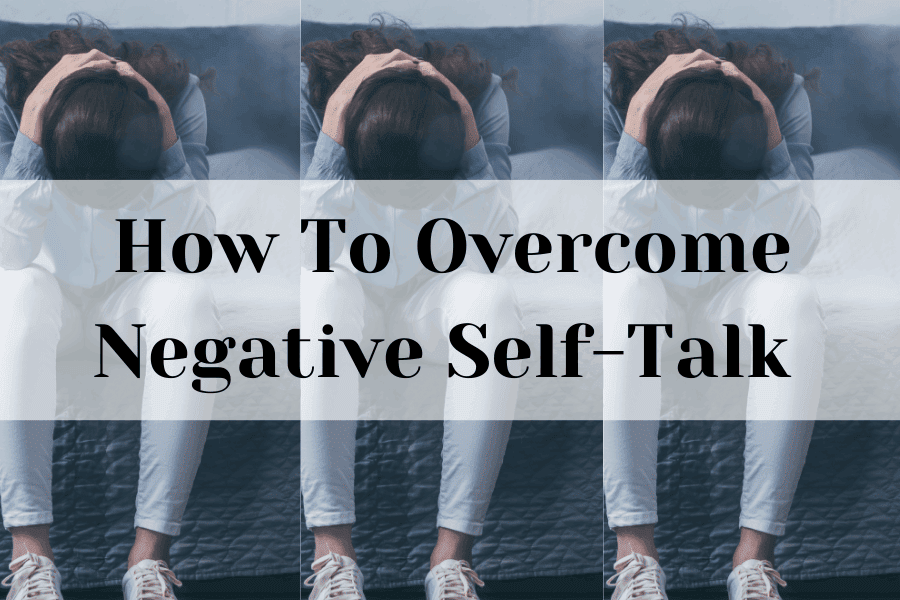How To Overcome Negative Self-Talk

Learning how to overcome negative self-talk can be a game-changer in your life. We’ve all been there when that little voice pops up in your mind, making you doubt your own abilities.
This blog post highlights how to overcome negative self-talk and create a positive mindset.
This post is about how to overcome negative self-talk

Understanding Negative Self-Talk
It’s crucial to grasp what it is and how it affects us. Negative self-talk is that pesky inner voice that loves to criticise, doubt, and fill our heads with negative beliefs about ourselves. It’s like having a not-so-friendly companion tagging along, constantly whispering discouragement in our ears.
Negative self-talk can really mess with our lives. It can chip away at our self-esteem, making us doubt our abilities and worth. It seeps into our relationships, creating unnecessary conflicts and distance. And worst of all, it takes a toll on our overall well-being, dragging us down into a spiral of negativity.
But fear not! We can conquer this and learn how to overcome negative self-talk together. The first step is recognising its sneaky patterns. You know, those little voices that tell us we’re not good enough, that we’ll fail no matter what, or that everything is going to fall apart. By becoming aware of these patterns, we can start to regain control over our thoughts.
Pay close attention to those negative whispers. Are you catastrophising situations, imagining the worst possible outcomes? Do you tend to personalise things, blaming yourself for everything that goes wrong? Or perhaps you’re filtering out all the positive aspects and solely focusing on the negatives? Identifying these patterns is key to breaking free from their grip.
But remember, we’re not here to wallow in negativity. We’re here to challenge and overcome negative self-talk and turn things around. We’re going to put on our detective hats and investigate the evidence behind those negative thoughts. Are they really true? Can we find solid proof to support them? More often than not, we’ll discover that these thoughts are exaggerated or unfounded.
Cognitive re-framing
It’s like putting on a pair of positivity glasses. We’ll actively replace those negative thoughts with more realistic and positive alternatives. Let’s say you made a mistake at work. Instead of beating yourself up and thinking, “I’m such a failure,” you can reframe it to, “Mistakes happen, and I’m learning and growing from this experience.” See? We’re shifting the perspective.
Oh, and don’t forget about the power of affirmations and positive self-talk. Repeat uplifting phrases to yourself like, “I am capable,” “I am worthy,” and “I can handle anything that comes my way.” It may feel a bit cheesy at first, but trust me, it works wonders in rewiring our minds for positivity.
Let’s take a stand against negative self-talk. We’ve got this! Together, we’ll challenge those negative thoughts, cultivate self-compassion, and build resilience. In no time, we’ll be rocking a positive mindset and living our lives to the fullest. Keep believing in yourself—you’re stronger than you think!
Recognising Common Patterns of Self-Talk
It’s like learning to spot those sneaky little habits that have been holding us back. Once we identify them, we’ll be one step closer to breaking free from their grip.
Catastrophising
So, grab your detective hat and let’s dive in. One common pattern is catastrophising—when we imagine the absolute worst-case scenarios. Picture this: you have a presentation coming up, and your mind starts racing with thoughts like, “I’ll embarrass myself in front of everyone,” or “It’ll be a complete disaster!” Sound familiar? It’s time to catch those catastrophic thoughts and replace them with a more realistic outlook.
Personalising
Next up, we have personalising. This is when we take things a little too personally, blaming ourselves for everything that goes wrong. Let’s say a friend cancels plans, and immediately, you think, “They don’t want to spend time with me because I’m boring.” Hold up, my friend! It’s essential to challenge these thoughts and consider other possibilities. Maybe your friend had a rough day or something urgent came up. It’s not always about you!
Filtering out the positives
Now, let’s shine a light on filtering out the positives. Have you ever accomplished something fantastic, but your mind fixated only on one tiny flaw? That’s filtering. It’s like zooming in on the negatives while completely disregarding the positives. We need to break this pattern, my friend. Start acknowledging and celebrating your achievements, big and small. Don’t let that negativity filter dampen your spirits.
The key here is self-awareness. By paying attention to our thoughts and noticing these patterns, we empower ourselves to interrupt the cycle. Remember, we’re not aiming for perfection, but progress. Catching those negative self-talk patterns in action is a victory in itself.
Oh, and don’t be too hard on yourself if you slip up occasionally. Breaking old habits takes time and effort. Just keep reminding yourself that you’re on a journey of growth and self-improvement. With practice, patience, and a dash of self-compassion, we’ll conquer those negative self-talk patterns and pave the way for a more positive mindset.
Stay vigilant and keep an eye out for those sneaky patterns. We’re taking charge of our inner dialogue, one thought at a time and learning to overcome negative self-talk. Together, we’ll transform our self-talk and unleash a world of positivity and self-belief. Get ready to embrace a brighter, more empowered version of yourself. You’ve got this!
Challenging Negative Self-Talk
It’s time to roll up our sleeves and take a stand against those nagging negative thoughts. We’re going to question them, challenge them, and reclaim our power!
First things first, we need to question the validity of those negative thoughts. Ask yourself, “Is this thought really true? Is there solid evidence to support it?” Often, we’ll find that our negative self-talk is based on assumptions, fears, or past experiences that may not be relevant anymore. It’s time to debunk those unfounded beliefs.
Cognitive reframing
Now, let’s kick it up a notch with cognitive reframing. It’s like putting on a pair of superhero glasses that reveal the truth behind our negative thoughts. So, when that voice inside says, “I’ll never succeed,” let’s challenge it with an alternative thought like, “I may face challenges, but I’ve overcome obstacles before, and I have the skills and determination to achieve my goals.” See what we did there? We’re flipping the script and empowering ourselves with a more positive outlook.
Affirmations and positive self-talk
But wait, there’s more! We’ve got affirmations and positive self-talk in our toolkit. It’s time to unleash their superpowers! Repeat uplifting phrases to yourself like, “I am strong,” “I am capable,” and “I am deserving of success.” It might feel a little silly at first, but trust me, my friend, these positive affirmations can rewire our minds and boost our self-belief. Remember, we’re rewiring, not just repeating!
Visual reminders
Here’s a handy tip: surround yourself with visual reminders of positivity. Stick Post-it notes with affirmations on your mirror, set positive reminders as notifications on your phone, or create a vision board filled with images that inspire you. These visual cues can serve as gentle nudges to challenge negative self-talk whenever it sneaks in.
Overcoming negative self-talk won’t happen overnight. It takes practice and persistence. So, be patient with yourself. Celebrate every small victory along the way. And when you stumble or find yourself slipping back into old patterns, remember that it’s all part of the journey. Dust yourself off, remind yourself of your strength, and keep pushing forward.
Together, we’re taking a stand against negative self-talk. We’re reclaiming our power by challenging those negative thoughts, reframing them with positivity, and embracing affirmations and positive self-talk. Step by step, thought by thought, we’re creating a more empowering and uplifting inner dialogue. Trust yourself, my friend, and know that you’re on the path to cultivating a mindset filled with self-belief and positivity. You’ve got this!
Cultivating Self-Compassion
Self-Care
Self-compassion starts with self-care. It’s about prioritizing your well-being, both physically and emotionally. Take time out for activities that nourish your soul, whether it’s going for a walk in nature, indulging in a good book, or enjoying a relaxing bubble bath. Remember, my friend, you deserve moments of joy and rejuvenation.
Self-acceptance
Another key aspect of self-compassion is self-acceptance. Embrace all parts of yourself—the strengths, the flaws, and everything in between. Remember, perfection is an illusion. We’re all beautifully imperfect beings, and that’s what makes us unique and special. So, embrace your quirks, your quirks make you who you are!
Forgiveness
And let’s not forget about forgiveness. We all make mistakes; it’s part of being human. Instead of holding onto grudges or self-blame, offer yourself forgiveness. Learn from the past, but don’t let it define you. Release the burden of guilt and allow yourself to move forward with a lighter heart.
Self-compassion is not a sign of weakness; it’s a tremendous strength. It allows us to nurture and care for ourselves, creating a solid foundation of self-love and resilience. So, when that negative self-talk creeps in, replace it with a compassionate and understanding voice. Offer yourself words of encouragement and remind yourself that you’re doing the best you can in every moment.
Remember, cultivating self-compassion takes time and practice. Be patient with yourself and treat each step of the journey as a valuable lesson. Surround yourself with supportive friends and loved ones who uplift and celebrate you. And if you ever need a little extra support, don’t hesitate to reach out to a trusted friend or seek guidance from a mental health professional.
Building Resilience Against Negative Self-Talk
Resilience is all about our ability to adapt, learn, and grow in the face of challenges. It’s like having a superpower that helps us weather the storms of life with grace and determination. And guess what? We all have that power within us—it just needs a little nurturing.
Set realistic goals
First things first, let’s set realistic goals. When we aim for the stars without considering the steps in between, we set ourselves up for disappointment and negative self-talk. Break down your goals into manageable, bite-sized tasks. Celebrate each small victory along the way. Remember, progress, no matter how small, is still progress.
Maintain perspective
Maintaining perspective is another crucial aspect of building resilience. When faced with setbacks, it’s easy to get caught up in negativity and think, “Everything is ruined!” But take a deep breath and zoom out for a moment. Remember that setbacks are temporary and often provide valuable lessons. Look for the silver linings, the opportunities for growth and learning. Keep that big picture in mind, and you’ll see that setbacks are mere detours on your journey to success.
Seek support
Now, here’s a secret ingredient for resilience: seeking support. We don’t have to go through life’s challenges alone. Reach out to your support system—friends, family, mentors, or even support groups. Surround yourself with positive influences who lift you up and remind you of your strengths. Together, we’re stronger!
Learn from failures
And here’s a superhero move for you: learn from failures. Resilience isn’t about avoiding failure; it’s about bouncing back when it happens. Embrace failures as opportunities for growth and development. Analyse what went wrong, extract the lessons, and apply them to future endeavours. Remember, even the most successful superheroes stumble along the way. It’s how we rise after falling that truly defines our strength.
Let’s embrace our resilience and conquer negative self-talk with unwavering determination. Set realistic goals, maintain perspective, seek support, and learn from failures. You have the power within you to overcome any challenge and emerge stronger than ever before.
But remember, building resilience is a journey, not an overnight transformation. Be patient with yourself, celebrate your progress, and never underestimate your inner strength. Together, we’re superheroes of resilience, ready to face whatever comes our way. So, put that cape on, my friend, and let’s soar to new heights of resilience and self-belief. You’ve got this!
Developing A Positive Mindset To Overcome Negative Self-Talk
It’s time to prioritise your well-being and shower yourself with the love and care you deserve.
Self-care is all about nourishing your body, mind, and soul. It’s like giving yourself a big, warm hug from the inside out. And let me tell you, it’s not selfish—it’s necessary! When we take care of ourselves, we recharge our batteries, replenish our energy, and become better equipped to handle life’s challenges.
Physical self-care
First things first, let’s talk about physical self-care. Get moving! Engage in activities that make your body feel alive and vibrant. It could be dancing, jogging, practising yoga, or simply going for a leisurely walk in nature. Find what brings you joy and gets your body moving. And don’t forget to nourish yourself with healthy, balanced meals that fuel your body and mind.
Mental and emotional self-care
Next up, we have mental and emotional self-care. It’s time to give your mind some well-deserved TLC. Engage in activities that bring you peace and calm, whether it’s reading a book, journaling, meditating, or indulging in a hobby you love. Take breaks from technology and create space for solitude and reflection. It’s these little moments of self-reflection and mindfulness that can do wonders for your mental and emotional well-being.
Set boundaries
Now, let’s talk about the importance of setting boundaries. Saying “no” when you need to is a powerful act of self-care. It’s about respecting your own limits and prioritising your needs. Don’t spread yourself too thin. Learn to prioritise what truly matters to you and give yourself permission to let go of tasks or commitments that don’t align with your well-being.
Rest and relaxation
And here’s a secret ingredient for self-care: quality rest and relaxation. Get that beauty sleep! Make sure you’re getting enough restful sleep each night. Create a bedtime routine that helps you unwind and prepare for a rejuvenating sleep. And during the day, take short breaks to recharge—whether it’s a power nap, a moment of deep breathing, or simply closing your eyes and giving your mind a mini-vacation.
Remember, my friend, self-care is not a luxury, but a necessity. It’s about creating a sustainable lifestyle that prioritises your well-being. So, indulge in self-care guilt-free, knowing that you’re taking the necessary steps to nurture yourself from within.
Embrace self-care as a vital part of your life, and let it be a source of joy, restoration, and balance. Take care of your body, nurture your mind, set boundaries, and make quality rest a priority. When you prioritise self-care, you’ll find that negative self-talk slowly loses its power, and a sense of well-being and positivity fills your life.
Make self-care a non-negotiable part of your life. Take that time for yourself, show yourself some love, and watch as your well-being flourishes. You are worthy of self-care, and you deserve to thrive. Keep nurturing yourself and enjoy the journey of self-discovery and self-love.
Practising Gratitude To Overcome Negative Self-Talk
Gratitude is like a magic potion that transforms our perspective and shifts our focus to the good things in life. It’s about acknowledging and appreciating the blessings, big and small, that surround us every day. And let me tell you, there’s so much to be grateful for!
Gratitude Journal
Start by keeping a gratitude journal. Each day, jot down three things you’re grateful for. It could be as simple as a warm cup of coffee in the morning, a kind word from a friend, or the beauty of a sunset. By actively seeking out moments of gratitude, we train our minds to focus on the positive and cultivate a more optimistic outlook.
Express gratitude to others
Take the time to let people know how much you appreciate them. Send a heartfelt thank-you note, give a genuine compliment, or simply say “I appreciate you.” These small acts of gratitude not only brighten someone else’s day but also fill your own heart with joy and warmth.
Appreciate yourself
Let’s also remember to appreciate ourselves. Celebrate your accomplishments, both big and small. Acknowledge your strengths, your resilience, and your growth. Treat yourself with kindness and appreciation. You’re doing amazing things, my friend, and you deserve to recognise and celebrate your own awesomeness.
Mindfulness
And here’s a little secret: practice mindfulness. Be fully present in the moment and notice the beauty and abundance that surrounds you. Whether it’s the smell of fresh flowers, the sound of laughter, or the feeling of warm sunlight on your skin, savour those precious moments and let gratitude fill your heart.
Cultivate gratitude as a way of life. Keep a gratitude journal, express appreciation to others, appreciate yourself, reframe challenges and practice mindfulness. As you infuse gratitude into your daily routine, you’ll find that negative self-talk fades away, replaced by a deep sense of appreciation and contentment.
Remember, gratitude is a superpower that you possess within you. Embrace it and let it light up your life with positivity and joy. Keep counting your blessings, both big and small, and watch as your world becomes a brighter and more grateful place.
You’ve got this, my gratitude warrior! Embrace the power of gratitude, and let it be your guiding light on this incredible journey of self-discovery, positivity and to rid of negative self-talk.
What We Have Learned About Overcoming Negative Self-Talk
Remember, negative self-talk doesn’t define you. You have the power to rewrite the script, to silence the inner critic, and to embrace a positive mindset. It all starts with awareness—being mindful of your thoughts and the impact they have on your emotions and actions. From there, you can challenge those negative thoughts, replace them with positive affirmations, and create a supportive inner dialogue.
Building a positive mindset is a lifelong journey. It takes practice, patience, and self-compassion. Surround yourself with positive influences, cultivate gratitude, and celebrate your strengths and accomplishments. Remember, you are capable of amazing things, and you deserve all the love, happiness, and success that life has to offer.
When negative self-talk tries to sneak its way back into your life, stand tall and remind yourself of your worth. You are unique, resilient, and worthy of all the good things that come your way. Believe in yourself and watch as your positive mindset takes root and flourishes.
And if ever you stumble along the way, don’t be discouraged. Embrace those moments as opportunities for growth, and draw strength from the lessons learned. Reach out to your support system, lean on your loved ones, and seek guidance when needed. You don’t have to face this journey alone.
As you embark on this journey of overcoming negative self-talk and embracing a positive mindset, know that you have everything it takes to succeed. Trust in your abilities, practice self-care, and remember to be kind to yourself. You are deserving of love, happiness, and all the wonderful things that life has in store for you.
Believe in yourself and never underestimate the power of your thoughts. With each positive affirmation, each act of self-compassion, and each moment of gratitude, you’re creating a life filled with positivity and joy.
This post was about how to overcome negative self-talk
Share this post: on Twitter on Facebook






